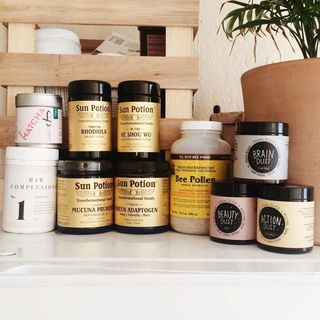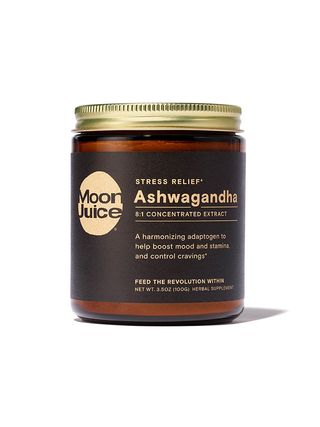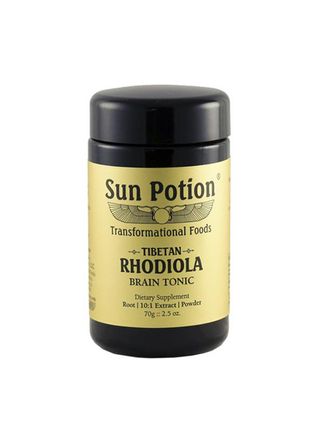7 Herbs That Can Help Curb Anxiety, According to Science


It’s little wonder why we find ourselves reaching for herbal remedies for anxiety considering that four out of five adults feel stressed every week (and one in 10 of us are stressed all the time). Saying "I’m stressed” rolls off the tongue with as much ease as blurting out your Starbucks order, and it’s likely that whoever you’re talking to will barely bat an eyelid at your statement. And if they do, chances are the conversation could well spiral into a stress-off, where whoever involved will list off everything that’s causing them to feel anxious and under pressure until both parties crumble and end up feeling more depressed than they were to begin with.
Anxiety is characterized by that tight feeling in your chest, a gurgling tummy, shallow breathing, clammy hands, and dry mouth. No one wants to experience that on a daily basis, and for some, it can escalate into dizziness, heart palpitations, panic attacks, and bouts of insomnia. And while many choose to counteract these symptoms under the guidance of a medical professional, it's unsurprising that there’s also a growing interest in using herbal remedies to cure anxiety. Chiming in with our yearning for more natural plant-based problem solvers, these teas, tinctures, and tablets won’t affect your gut health, will rebalance both your mind and your body, and can be taken on a regular basis. (Just check in with your doc before making any drastic changes to your routine.)
Read on to discover the herbs that will ward off your worries.
HEALING HERBS
Rhodiola rosea: If you’re feeling low or finding yourself suffering from mood swings, this will stimulate the production of dopamine and serotonin in your brain, helping to create a sense of overall well-being—which is what you need if you’re anxious. Victoria Kearns, a medical herbalist, recommends this especially for those with chronic anxiety.
Melissa (lemon balm): This works on the digestive system–vagus nerve relationship. If the latter is out of sync, you might notice that knot in your stomach tightening or your heart beating faster. “Melissa calms the central nervous system and feeds back to the brain that all is well,” says Kearns. Take this, and that churning feeling should go away.
Ashwagandha: One of the hero herbs in Ayurveda, this is also an adaptogen, which means it naturally monitors and modulates the body’s stress responses. Since this one is often referred to as Indian ginseng, it’s important to make sure you aren’t confusing it with panax ginseng. While both are perfectly safe, the latter stimulates dopamine, so it can’t be taken with anti-anxiety drugs. Pregnant women should also double-check with their doctors before use.
Oat straw: “A beautiful ancient woman’s herb for calming the nervous system,” says Kearns. This herb was used in infusions for centuries to treat depression. Add some to warm water or nut milk and a squeeze of honey, and you’ve got a hug in a mug. Consider it the new matcha latte.
Motherwort: Known for its ability to prevent heart palpitations, anxiety panic attacks, and chest pains, this will slow things down and get you back on an even keel.
Tilia (lime blossom): This is a good one if you can’t switch off at night and your sleep is being impacted. It facilitates a soothing effect on the brain and is a known immune booster, so if you feel like you have a cold coming on, take this before it gets any worse.
Hawthorn: This is very good for slowing down the heartbeat. But beware: You need to take a fairly strong dose of it. After all, it is known as the heart herb.
HOW SHOULD I TAKE THEM?
Herbs can be ingested as teas, powders, pills, or tinctures, and while you can get each of the above individually, if you want to be certain you’re getting a good therapeutic dose that’s really going to stop your anxiety in its tracks, it’s a good idea to seek the advice of a herbalist. “Often it’s the combined action that will nudge things along, so I might recommend taking Rhodiola rosea with Melissa or blending Tilia and hawthorn together,” says Kearns.
If you do go off-the-shelf, always be sure to follow the recommended dosage.
WHEN WILL I NOTICE A DIFFERENCE?
Usually within one to two weeks, but even as a resolute devotee to herbal remedies, Kearns suggests looking at other lifestyle factors. “Herbs are brilliant for getting you over a hump if you’re really up against it, but then you do need to examine what else is going on and what’s causing your anxiety—do you need to slow down a bit, cut back on work, or learn to breathe properly?" says Kearns.
On that note, learn more about how herbs can improve your well-being.
This story was originally published on Byrdie UK.
Disclaimer
This article is provided for informational purposes only and is not intended to be used in the place of advice of your physician or other medical professionals. You should always consult with your doctor or healthcare provider first with any health-related questions.



